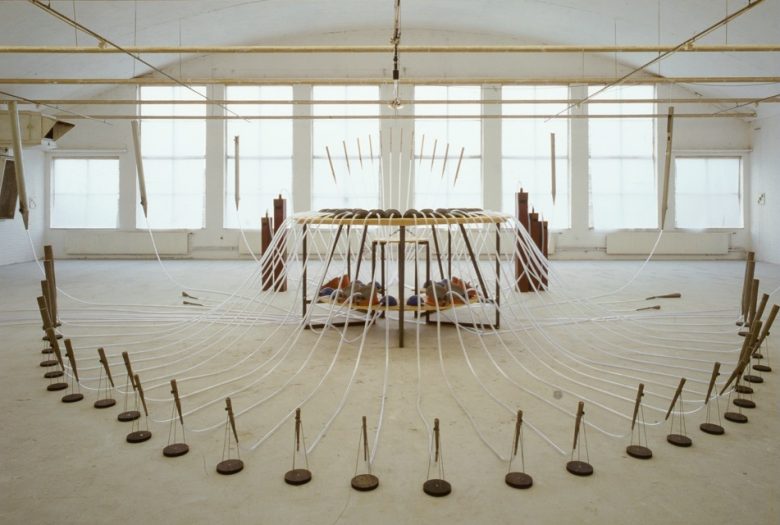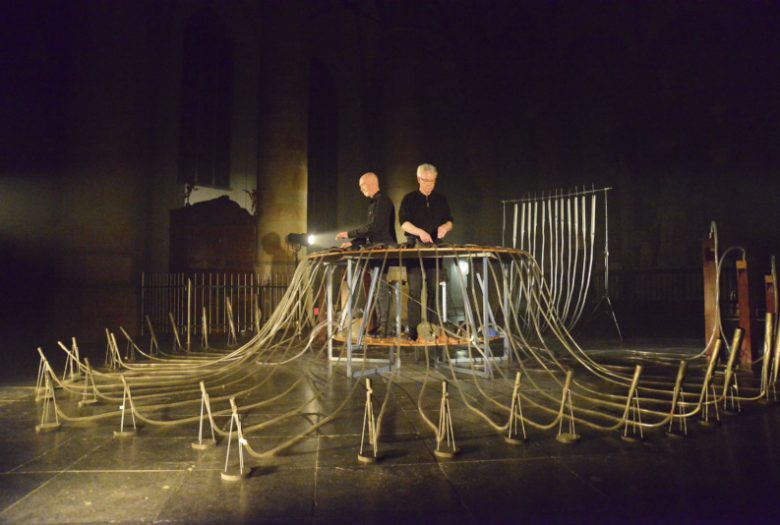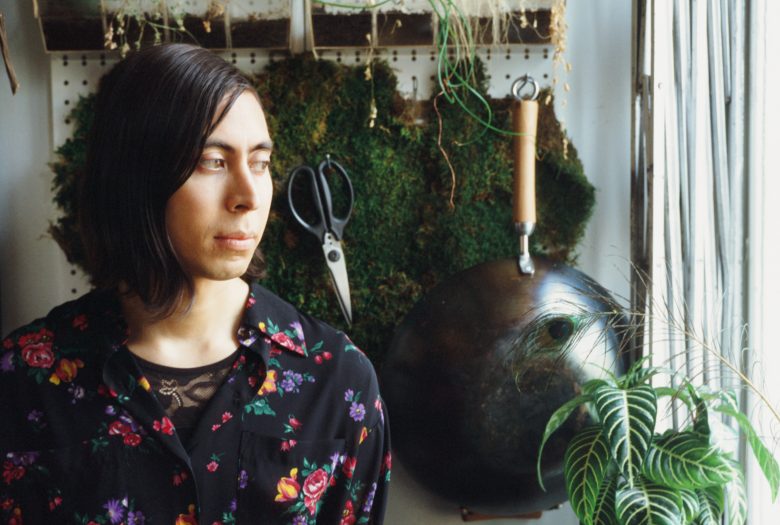The singularly exceptional composer/singer/storyteller Shelley Hirsch performs with Horst Rickels’s curiously magical instrument constructed from cannibalized organ pipes, toilet plungers, and bicycle pumps, alongside some new and surprising creations. The Mercurius Wagon, built for Hirsch 30 years ago and restored especially for this event, is one of Rickels’s signature works, alongside a lifetime of sound installations, acoustic architecture, and music for film. Witness two unpredictable and uncompromising artists that always inspire through joy, tears, and wonder.
Sources of Power explores the authenticity in developing a new voice. Utilizing electronics, voice, and movement, Crystal Penalosa‘s new piece examines the vulnerability, power, and potential for safety that voice-work can lend to people who are transgender. The performance blends traditional voice—expanding the conduits of vocal training, breath work, and speech therapy—with non-traditional technological methods such as pitch shifting, frequency shifting, and wavetable synthesis.
Shelley Hirsch is an award-winning, critically acclaimed vocalist, composer, and storyteller whose mostly solo compositions, staged multimedia works, improvisations, radio plays, installations and collaborations have been produced and presented in concert halls, clubs, festivals, theaters, museums, galleries and on radio, film and television on 5 continents. Hirsch began touring at age 19 in an experimental theater company in the SF Bay area and brings many of those concepts to her work today. She has been called a fountain of sonic mercury and has a virtuosic command of extended vocal techniques and vocal styles, imparting an enormous versatility to her music. Whether on her written narrative works such as O Little Town of East New York, her homage and virtual duet with the late great Jerry Hunt, or her stream of consciousness free improvisations, she uses the body as the storage house of memory to bring her unique music storytelling to life. Hirsch can be heard on over 70 commercial recordings, including several improvised music collaborations on FMP and several of her composed works and collaborations on Tzadik. She is the 2017 recipient of a prestigious Guggenheim Fellowship and a Foundation for Contemporary Arts fellowship and remains both internationally renowned and an essential figure of New York’s avant-garde downtown scene.
Horst Rickels studied piano construction at Grotrian-Steinway in Braunschweig and worked in that function at Bechstein in Berlin. After this he studied music in Kassel where he composed ballet and theater music for the Staatstheater and was a member of the underground-band ‘Pigblood’. In 1972 he started studying electronic composition at the Royal Conservatory in Den Haag. From 1973 he worked as a composer for the theater group Proloog in Eindhoven. In 1983 he earned his degree in music theory at the Brabants Conservatorium. During the next years, he formulated new principles for multimedia theater, resulting in Van Gogh’s Laatste Oor and The Simulated Wood, among others. Subsequently, he focused his research on the development of sound objects, sound sculptures, and sound installations.
The central question of his research is how the principle of instability of tuning-systems, pictorial structures and performance practices can be made the central theme of artworks. Another important aspect of his research is the study of spatial qualities of sound in relation to the natural and artificial environment. As a sound artist, he has shown his works in many countries and at international festivals. Often he has participated in projects that aimed at transforming outstanding places into a soundscape, such as Fort Klank in 1994 in which he, Dick Raaijmakers, and Walter Maioli transformed an old fortification into a monumental musical instrument.
Crystal Penalosa (she/they) is an American artist and interdisciplinary designer based in New York. Their work focuses on queer identity, utilizing modular electronics, and voice. Her solo work makes public their search for authenticity and how it intersects with trans visibility. She uses electronics, voice, and light in a performance exploring how voice is a source of power and safety. The structure is meditative and is centered on voice affirmations written during voice self-therapy. Penalosa has performed collaboratively and solo at Issue Project Room, Roulette Intermedium, Sediment Gallery, MoMA PS1, Experimental Intermedia, Spektrum in Berlin, and the Golden Pudel Club in Hamburg. They currently work with the veteran underground record label Generations Unlimited.
Presented as part of Mixology Festival 2019: Signaling – artists whose work in sound and media contains embedded truths, both heartening and startling. Active for over 25 years, Roulette’s Mixology Festival celebrates new and unusual uses of technology in music and the media arts. Primarily a snapshot of current activity, the festival strives to reflect both the history and trends of innovation that impact the Zeitgeist. Curated by David Weinstein
If there is still one hellish, truly accursed thing in our time, it is our artistic dallying with forms, instead of being like victims burnt at the stake, signaling through the flames. — Antonin Artaud
Deep has to do with complexities, boundaries or edges beyond ordinary or habitual understanding. A deep thinker defies stereotypical knowing and it may take either a long time or never to understand her. —Pauline Oliveros



